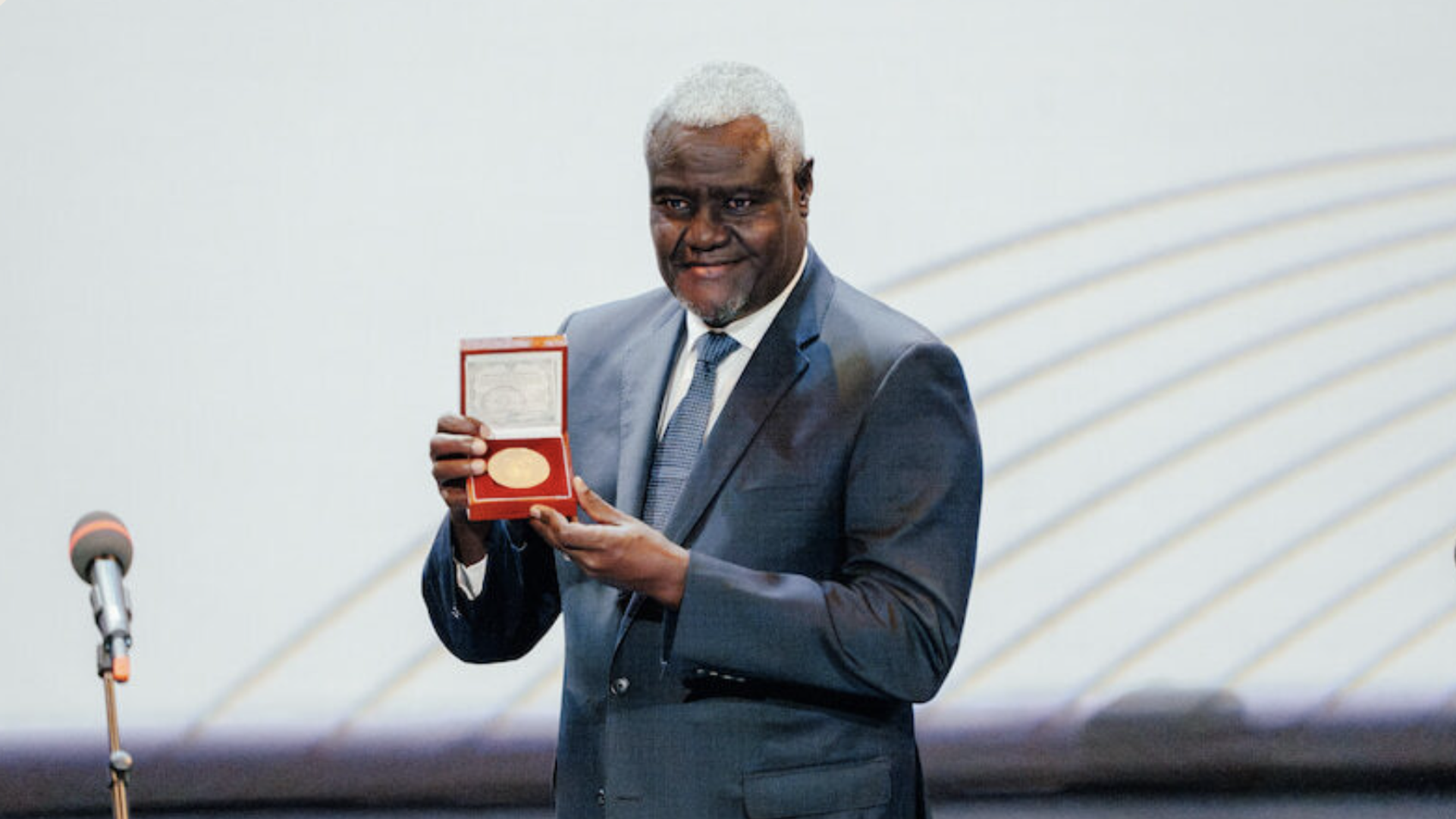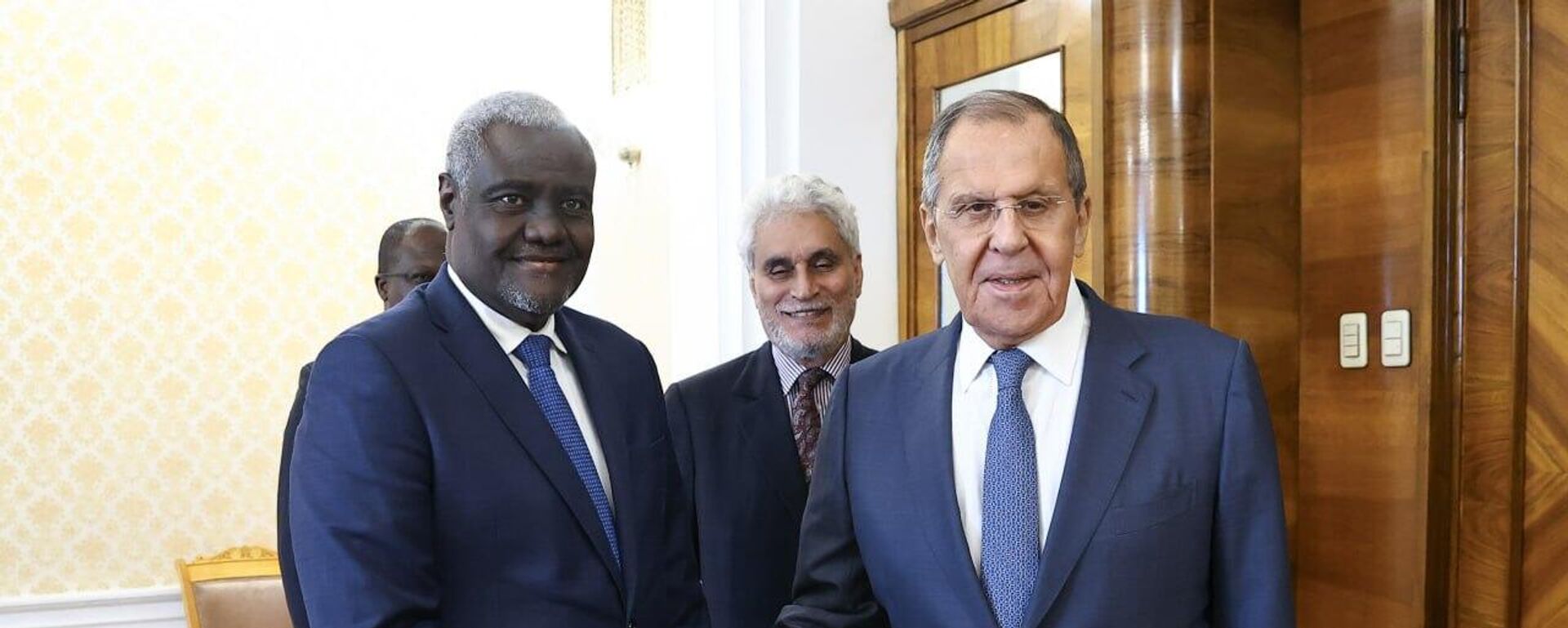https://en.sputniknews.africa/20240914/the-aus-tolstoy-prize-win-is-step-towards-global-equity-south-african-professor-believes-1068278882.html
The AU’s Tolstoy Prize Win is Step Towards Global Equity, South African Professor Believes
The AU’s Tolstoy Prize Win is Step Towards Global Equity, South African Professor Believes
Sputnik Africa
On September 9, Moussa Faki Mahamat, chairman of the African Union, was awarded the Leo Tolstoy Peace Prize in Moscow in recognition of the organization's... 14.09.2024, Sputnik Africa
2024-09-14T18:11+0200
2024-09-14T18:11+0200
2024-09-16T12:10+0200
opinion
africa insight
sputnik africa
african union (au)
africa
russia
france
united states (us)
multipolarity
politics
https://cdn1.img.sputniknews.africa/img/07e8/09/0e/1068279679_0:0:1678:944_1920x0_80_0_0_1058dc728f4e2def635978ef369bb1af.png
The African Union’s (AU) receipt of the first-ever Leo Tolstoy Peace Prize marks a significant moment for both the organization and the continent, Professor Zwelethu Jolobe, Head of the Political Studies Department at the University of Cape Town, told Sputnik Africa.The AU, while lacking the interventionist powers of other regional bodies like the European Union, has nonetheless made strides in peacekeeping and mediation.The challenges, however, remain steep, largely due to external interference, as many of Africa's conflicts have become proxy wars for former colonial powers like France and the United States.Jolobe’s vision for Africa’s future also extends beyond political and economic alliances. While much attention is often focused on Africa’s economic ties with major global players, Jolobe believes that fostering softer connections—such as those rooted in cultural, artistic, and sporting exchanges—could be just as important. He specifically highlighted Russia’s role in this process, noting that the country has historical ties to several African nations, including South Africa, Angola, and Namibia. Reviving these connections could play a crucial role in reshaping Africa’s global relations beyond the usual military and economic frameworks.Moreover, for Jolobe, the award is not merely a nod to the AU’s achievements but a "step towards trying to find each other after a long period of absence." By this, he refers to Africa’s and Russia’s shared historical connections, which were once united by a vision of an equitable world.A Time of Global InequityOne of the key challenges Jolobe identified, both for Africa and the world at large, is the growing sense of inequity within the global system. He pointed to what he described as a "politics of exclusion," wherein the rules of the international system disproportionately favor certain regions, often to the detriment of others. Africa, he argued, is one of the regions that suffers most from this imbalance. Despite being rich in natural resources, many African nations are locked into trade agreements and economic systems that prevent them from fully benefiting from their own wealth.Jolobe sees the Tolstoy Peace Prize as a stepping stone towards addressing these inequities. As the AU continues to champion peace and unity across Africa, it is also becoming a leading voice in global discussions on justice and equality. The AU’s efforts to build a fairer, more inclusive global system are aligned with a broader movement towards what many now call multipolarity—a world in which no single power dominates and all nations have an equal stake.
https://en.sputniknews.africa/20240910/russia-and-african-union-deepen-ties-emphasizing-peace-security-and-development-1068228165.html
africa
russia
france
united states (us)
europe
north america
Sputnik Africa
feedback@sputniknews.com
+74956456601
MIA „Rossiya Segodnya“
2024
Christina Glazkova
https://cdn1.img.sputniknews.africa/img/07e7/0b/07/1063380906_0:0:673:674_100x100_80_0_0_79628b4d0cd9f29291a57aa13bbf9e7a.jpg
Christina Glazkova
https://cdn1.img.sputniknews.africa/img/07e7/0b/07/1063380906_0:0:673:674_100x100_80_0_0_79628b4d0cd9f29291a57aa13bbf9e7a.jpg
News
en_EN
Sputnik Africa
feedback@sputniknews.com
+74956456601
MIA „Rossiya Segodnya“
Sputnik Africa
feedback@sputniknews.com
+74956456601
MIA „Rossiya Segodnya“
Christina Glazkova
https://cdn1.img.sputniknews.africa/img/07e7/0b/07/1063380906_0:0:673:674_100x100_80_0_0_79628b4d0cd9f29291a57aa13bbf9e7a.jpg
africa insight, sputnik africa, african union (au), africa, russia, france, united states (us), multipolarity, politics, european union (eu), europe, diplomacy, neocolonialism, colonialism, north america, leo tolstoy international peace prize foundation
africa insight, sputnik africa, african union (au), africa, russia, france, united states (us), multipolarity, politics, european union (eu), europe, diplomacy, neocolonialism, colonialism, north america, leo tolstoy international peace prize foundation
The AU’s Tolstoy Prize Win is Step Towards Global Equity, South African Professor Believes
18:11 14.09.2024 (Updated: 12:10 16.09.2024) Christina Glazkova
Writer / Editor
On September 9, Moussa Faki Mahamat, chairman of the African Union, was awarded the Leo Tolstoy Peace Prize in Moscow in recognition of the organization's peacekeeping efforts, among other initiatives.
The
African Union’s (AU) receipt of the first-ever Leo Tolstoy Peace Prize marks a significant moment for both the organization and the continent,
Professor Zwelethu Jolobe, Head of the Political Studies Department at the University of Cape Town,
told Sputnik Africa.
The AU, while lacking the interventionist powers of other regional bodies like the
European Union, has nonetheless made strides in peacekeeping and mediation.
“The one area where the AU has made the most important contribution is peace,” Jolobe noted, emphasizing how it has been a vocal advocate and active participant in resolving regional conflicts.
The challenges, however, remain steep, largely due to external interference, as many of Africa's conflicts have become proxy wars for former
colonial powers like France and the United States.
“A meaningful role the AU can play is to try to disentangle a lot of former colonial power interests from Africa,” he said, suggesting that such a move would allow African countries to fully benefit from their own natural resources and increase their global standing.
Jolobe’s vision for Africa’s future also extends beyond political and economic alliances. While much attention is often focused on Africa’s economic ties with major global players, Jolobe believes that fostering softer connections—such as those rooted in cultural, artistic, and sporting exchanges—could be just as important. He specifically highlighted Russia’s role in this process, noting that the country has
historical ties to several African nations, including South Africa, Angola, and Namibia. Reviving these connections could play a crucial role in reshaping Africa’s global relations beyond the usual military and economic frameworks.
“The kind of connection is not one that's confined to elites only,” Jolobe stressed, advocating for a more inclusive approach to diplomacy that engages ordinary citizens and cultural communities.
Moreover, for Jolobe, the award is not merely a nod to the AU’s achievements but a "step towards trying to find each other after a long period of absence." By this, he refers to Africa’s and Russia’s shared historical connections, which were once united by a vision of an equitable world.
A Time of Global Inequity
One of the key challenges Jolobe identified, both for Africa and the world at large, is the growing sense of inequity within the global system. He pointed to what he described as a
"politics of exclusion," wherein the rules of the international system disproportionately favor certain regions, often to the detriment of others. Africa, he argued, is one of the regions that suffers most from this imbalance. Despite being rich in natural resources, many African nations are locked into trade agreements and economic systems that prevent them from fully benefiting from their own wealth.
Jolobe sees the Tolstoy Peace Prize as a stepping stone towards addressing these inequities. As the AU continues to champion peace and unity across Africa, it is also becoming a leading voice in global discussions on justice and equality. The AU’s efforts to build a fairer, more inclusive global system are aligned with a broader movement towards what many now call
multipolarity—a world in which no single power dominates and all nations have an equal stake.



